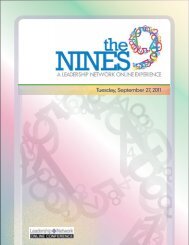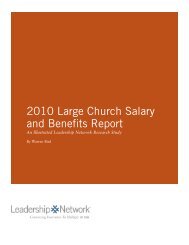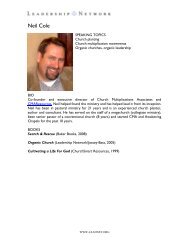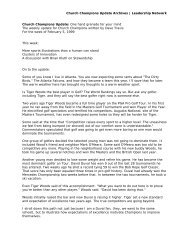ARE WE A PEOPLE AT HALF TIME? - Leadership Network
ARE WE A PEOPLE AT HALF TIME? - Leadership Network
ARE WE A PEOPLE AT HALF TIME? - Leadership Network
Create successful ePaper yourself
Turn your PDF publications into a flip-book with our unique Google optimized e-Paper software.
summer long, only in the last week of the<br />
cycle would most bystanders notice its<br />
“sudden” appearance. But by then, it is far<br />
past the tipping point.<br />
The <strong>Network</strong> Economy is a lily pond. The<br />
Web, as one example, is a leaf doubling in<br />
size every six months.<br />
In the <strong>Network</strong> Economy, significance<br />
precedes momentum.<br />
5. The Law of Increasing Returns<br />
Make virtuous circles<br />
The prime law of networking is known<br />
as the law of increasing returns. Value<br />
explodes with membership, and the value<br />
explosion sucks in more members,<br />
compounding the result. An old saying<br />
puts it more succinctly: “Them that’s got,<br />
shall get.”<br />
The law of increasing returns is far more<br />
than the textbook notion of economies of<br />
scale. In the old rules, Henry Ford leveraged<br />
his success in selling cars to devise more<br />
efficient methods of production. This<br />
enabled Ford to sell his cars more cheaply,<br />
which created larger sales, which fueled<br />
more innovation and even better production<br />
methods, sending his company to the<br />
top. While the law of increasing returns<br />
and the economies of scale both rely on<br />
positive feedback loops, the former is<br />
propelled by the amazing potency of net<br />
power, and the latter isn’t. First, industrial<br />
economies of scale increase value linearly,<br />
while the prime law increases value<br />
exponentially—the difference between a<br />
piggy bank and compounded interest.<br />
Second, and more important, industrial<br />
economies of scale stem from the<br />
Herculean efforts of a single organization<br />
to outpace the competition by creating<br />
value for less. The expertise (and advantage)<br />
developed by the leading company is<br />
its alone. By contrast, networked increasing<br />
returns are created and shared by the<br />
entire network. Many agents, users, and<br />
competitors together create the network’s<br />
value. Although the gains of increasing<br />
returns may be reaped unequally by one<br />
organization over another, the value of<br />
the gains resides in the greater web of<br />
relationships.<br />
We are headed into an era when both<br />
workers and consumers will feel more<br />
loyalty to a network than to any ordinary<br />
firm. The great innovation of Silicon<br />
Valley is not the wowie-zowie hardware<br />
and software it has invented, but the social<br />
organization of its companies and, most<br />
important, the networked architecture of<br />
the region itself—the tangled web of<br />
former jobs, intimate colleagues, information<br />
leakage from one firm to the next, rapid<br />
company life cycles, and the agile email<br />
culture. This social web, suffused into the<br />
warm hardware of jelly bean chips and<br />
copper neurons, creates a true <strong>Network</strong><br />
Economy.<br />
There is no future for hermetically sealed<br />
closed systems in the <strong>Network</strong> Economy.<br />
The more dimensions accessible to member<br />
input and creation, the more increasing<br />
returns can animate the network, the more<br />
the system will feed on itself and prosper.<br />
The less it allows these, the more it will be<br />
bypassed.<br />
The <strong>Network</strong> Economy rewards schemes<br />
that allow decentralized creation and<br />
punishes those that don’t. An automobile<br />
maker in the industrial age maintains<br />
control over all aspects of the car’s parts<br />
and construction. An automobile maker in<br />
the <strong>Network</strong> Economy will establish a web<br />
of standards and outsourced suppliers,<br />
encouraging the web itself to invent the<br />
car, seeding the system with knowledge it<br />
gives away, engaging as many participants<br />
as broadly as possible, in order to create a<br />
virtous loop where every member’s<br />
success is shared and leveraged by all.<br />
In the <strong>Network</strong> Economy, make virtuous<br />
circles.<br />
6. The law of Devolution<br />
Let go at the top<br />
The tightly linked nature of any economy,<br />
but especially the <strong>Network</strong> Economy’s<br />
ultraconnected constitution, makes it<br />
behave ecologically. The fate of individual<br />
organizations is not dependent entirely<br />
on their own merits, but also on the fate of<br />
their neighbors, their allies, their competitors,<br />
and, of course, that of the immediate<br />
environment.<br />
The rich, interactive, and highly plastic<br />
shape of the <strong>Network</strong> Economy resembles<br />
a biome seething with action. New niches<br />
pop up constantly and go away as fast. One<br />
day you are king of the mountain, and the<br />
next day there is no mountain at all.<br />
Biologists describe the struggle of an<br />
organism to adapt in this biome as a long<br />
climb uphill, where uphill means greater<br />
adaptation. In this visualization, an<br />
organism that is maximally adapted to the<br />
times is situated on a peak.<br />
All organizations (profit and nonprofit<br />
alike) face two problems as they attempt to<br />
find their peak of optimal fit. Both are<br />
amplified by a <strong>Network</strong> Economy in<br />
which turbulence is the norm.<br />
First, unlike the industrial arc’s relatively<br />
simple environment, where it was fairly<br />
clear what an optimal product looked like<br />
and where on the slow-moving horizon a<br />
company should place itself, it is increasingly<br />
difficult in the <strong>Network</strong> Economy to<br />
discern what hills are highest and what<br />
summits are false.<br />
The harsh news is that getting stuck is a<br />
certainty in the new economy. Sooner,<br />
rather than later, a product will be eclipsed<br />
at its prime. While one product is at its<br />
peak, another will move the mountain by<br />
changing the rules.<br />
There is only one way out. The organism<br />
must devolve. In order to go from one high<br />
peak to another, it must go downhill first<br />
and cross a valley before climbing uphill<br />
again. It must reverse itself and become<br />
less adapted, less fit, less optimal.<br />
This brings us to the second problem.<br />
Organizations, like living beings, are<br />
hardwired to optimize what they know and<br />
to not throw success away. Companies find<br />
devolving a) unthinkable, and b) impossible.<br />
There is simply no room in the enterprise<br />
for the concept of letting go—let alone the<br />
skill to let go—of something that is working,<br />
and trudge downhill toward chaos.<br />
But there is no alternative (that we know<br />
of) to leaving behind perfectly good products,<br />
expensively developed technologies,<br />
and wonderful brands and heading down<br />
8







